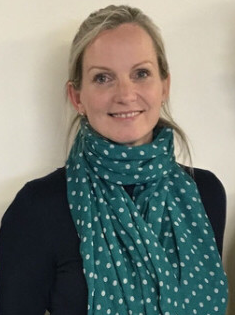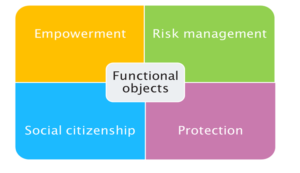Material Citizenship: the importance of functional objects in care homes whilst social distancing

ENRICHEnabling Research in Care Homes
GUEST BLOG
Material Citizenship: the importance of functional objects in care homes whilst social distancing
Dr Kellyn Lee, Research Fellow – Ageing and Dementia, School of Health Sciences, University of Southampton
I am passionate about conducting applied research that seeks to improve the experiences of those who live and work in care homes.
In this blog I introduce Material Citizenship (a conceptual framework developed from my PhD) as a way of providing care that supports residents to live an active and meaningful life during social distancing and beyond.

Following the spread of COVID-19, and in an unprecedented step, on the 23rd March 2020 the current Prime Minister Boris Johnson announced that UK residents must stay at home to adhere to social distancing rules in an attempt to reduce transmission. This quickly saw care homes close their doors to non-essential visits (including entertainers and therapists) and was closely followed by the difficult decision to ask relatives to stay away. For me, this meant that my care home research project (a collaboration with a care organisation to create a training programme from a framework I developed in my PhD) is suspended indefinitely.
Whilst the collaboration is currently on hold, some of the ideas feeding into the training could still be useful for care home staff, particularly at this time of social distancing.
The impact of COVID-19 and the restrictions placed on care homes brings many challenges. In particular, for me it raised the question:
“How can care home staff support residents live an active and meaningful life whilst social distancing?”
To offer up a solution I would like you introduce you to ‘Material Citizenship’.
Through my PhD study, I explored how decisions are made surrounding the personal possessions people take into a care home, how functional objects are used and by whom. I also explored whether a material lens was useful in locating social citizenship in dementia care. The result is the conceptual framework of Material Citizenship.
Material Citizenship is defined as:
‘The right to be included in decision-making relating to personal possessions and the right to have opportunities to use functional objects to perform everyday tasks.’
It is based upon ideas from social psychology and citizenship studies, emphasising the importance of both object-person relations (the interactions we have with objects) and ensuring people with a dementia have the same opportunities as everyone else.
Material Citizenship focuses on the use of functional objects in everyday life as a way of supporting and maintaining identity. Objects act as an extension of the self, i.e. ‘we are what we have’. It also focuses on the way in which people use objects, i.e. ‘we do stuff with stuff’. Objects can help us express who we are and who we want to be, and the interactions we have with objects (such as an iron, a vacuum cleaner or a certain tea cup) help support routines and rituals developed over a lifetime.
When talking about functional objects it is important to be clear what I mean by this term. The definition of functional objects is:
‘Any inanimate item which a person can use to perform a task not necessarily to completion or to any perceived standard, which maintains or supports cultivation of his or her identities.’
Enabling people to use functional objects to take part in everyday activities can be tricky, particularly when a decline in cognitive functioning can make taken-for-granted tasks difficult. Using various objects in a specific sequential order, e.g. making a cup of tea or coffee, can be problematic. My study also found that care home staff and relatives tended to view objects as hazardous and dangerous, and this prevented residents having access to everyday objects such as a hairdryer, a kettle or a pair of curling tongs. However, with support, it is possible for people to take part in these activities. With support, it is possible for people to spend less time in lounge chairs and begin interacting with the things in their environment.
The diagram below shows how functional objects can act as a mediator in the facilitation of care practices. Access to and use of functional objects can support the following:
- Empowerment – residents being able to take part in everyday life
- Social citizenship – residents being supported to make decisions and take action based upon those decisions
- Risk management – care home staff can use functional objects to assess the ‘real’ risk involved when using an object
- Protection – supporting care home staff to employ care practices which are not overly restrictive

Material Citizenship as a practice can provide residents with a sense of control and choice at a time when life may feel extremely restricted, such as during lockdown. It can also support staff to engage residents in meaningful activities at a time when resources are in short supply.
The message from this blog is that whilst we are facing challenges times, we also have the opportunity to approach care differently. Yes, there is a temporary suspension of activities provided by entertainers and therapists but we can view care home residents as active citizens who can take part in everyday activities, when they want to. This provides feelings of control, gives them the ability to choose the life they would like to lead, and increases levels of independence. With access to functional objects, they can maintain and express who they are and who they want to be. Arguably, this is more important now than it ever has been.
For further information please contact Dr Kellyn Lee